[Originally written by Mariko KIMURA, Mizuho OSAWA, and Ayat YAGHMOUR and published in the JVC Newsletter “Trial & Error” (No. 353, April 20, 2023); Translated by E. Miyazaki/E. Yocom]
When we talk about Palestine, many people focus on the issue of its unjust occupation by Israel. On the other hand, inside Palestine, women’s rights to go out freely, work, and to go to school are severely restricted due to the male-dominated patriarchal system. However, under these circumstances, there are women who have stood up to promote women’s rights, economic empowerment, and social engagement.
The harsh situation surrounding the Palestinian people
It has been 75 years since Israel declared its founding in Palestine. While oppression and violence from Israel against Palestinians are increasing, oppression of women by men is also increasing in the male-dominated Arab societies with strong patriarchal systems. In this issue, we would like to focus on such Palestinian women who live in difficult times and struggle with issues relating to society and family, while supporting others.
Let’s begin with the ‘Palestinian Issue,’ which lies in the background of the situation of Palestinian women. The Israeli-Palestinian problem is often thought of as a ‘conflict’ or ‘war’ between two different religions. However, in fact, it is a human rights violation by Israel with its overwhelming power, which consists of a unilateral occupation blockade, gradually depriving the land and merging with its own land. As a result, the Palestinian West Bank and Gaza Strip are surrounded by a thick concrete wall called the ‘Separation Wall,’ depriving the Palestinians’ freedom of movement.
Although this merge of occupied territories and the construction of the separation wall are clearly violations of international law, the international community has been unable to stop Israel’s actions due to the lack of legal forces such as penalties. Palestinians live their daily lives under such abnormal circumstances – their families are suddenly detained or killed by armed Israeli soldiers without any clear reason, and they are exposed to aerial bombing in areas where it is difficult to escape.
How did the Palestinian issue begin?
Originally, Palestine was not a state, but it was a land inhabited by Palestinians for hundreds of years. Before that, Jews had inhabited the city, but they were dispersed (diaspora) throughout the world due to the Crusader expeditions in the 11th century [1] and were persecuted in the places where they settled.
Even under these circumstances, the few Jews and Palestinians who remained and immigrated to the land lived together. However, with the influence of imperialism by the powerful nations [2], the conflict between the two deepened due to Zionism, a movement and ideology led by a certain group of Jews that aims to create a nation of only Jewish people, and Britain’s ‘Three-Tongue Diplomacy’ [3].
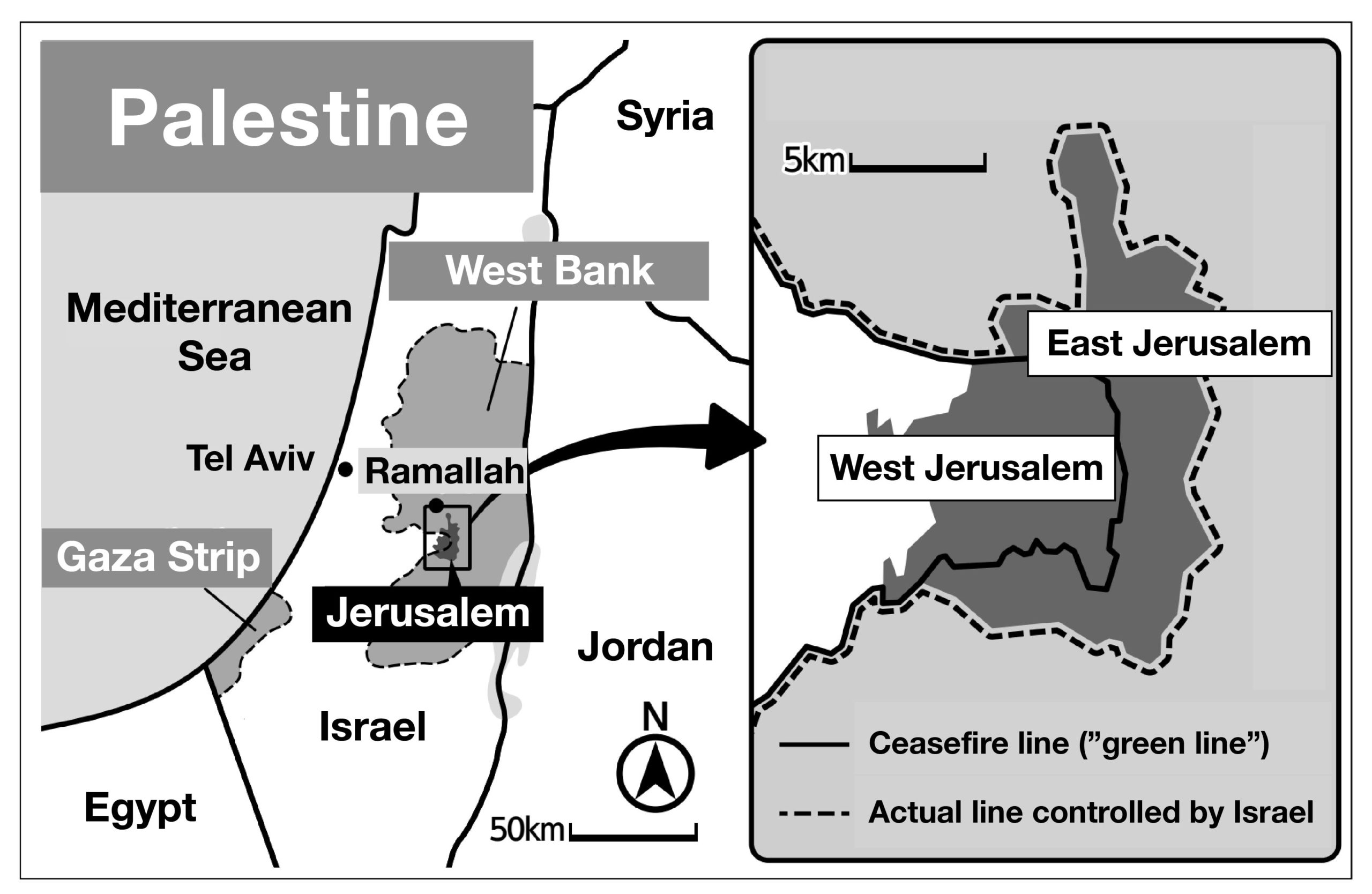
During World War II, the genocide of the Jews (the Holocaust) by Nazi Germany occurred, and it was up to the United Nations to resolve the confusion. However, the ‘United Nations Partition Plan for Palestine’ adopted in 1947 was an unjust proposal, which gave approximately 60% of the land to the Jews, who covered about 30% of the population living in the region at the time.
When Israel declared its founding of the nation in 1948, more than 150,000 Palestinians living in the area were displaced and became refugees in the country and abroad. After winning the war between Israel and the Arab states that opposed its founding, Israel seized control of the entire land of Palestine. A peace agreement was reached at one point, but later failed when then Israeli Prime Minister Yitzhak Rabin, who was seeking for a peaceful solution, was assassinated. Since then, Israeli settlement activities have continued and the situation surrounding the Palestinians has been deteriorating.
The challenges Palestinian women are facing
As well as the oppression and violence by Israel, Palestinian men face pressures of Arab society under notions such as “men must work to feed the family” and “men should be as such,” and are stressed by the difficulty of finding work under occupation. As a result, women and children are affected physically and psychologically by men in the form of domestic violence.
The long occupation and blockade have made an even stronger male-dominated Arab society. In many families, men are the decision makers, women have difficulty going out without the company or permission of a male family member, and because men are in charge of household finances, women are unable to spend money freely on their families or themselves. Also, women have no inheritance rights, and premature marriages of girls and honor killings [4] are also being practiced.
Because of these circumstances, there are many women who give up what they want to do, such as working and studying. Even if they want to work outside the home to help make a living, they do not have the knowledge or skills to do so, they cannot obtain the consent of their families, and they cannot even express their wishes due to power relations within the family.
Despite these difficulties, some women have stood up to improve the environment surrounding them as much as possible. One of them is Ms. Abeer Zayyad, Director of the Al Thouri Silwan Women’s Center (AWC), a local NGO that JVC works with in East Jerusalem. She will explain about AWC using her own words.
My passion for supporting women
I was born in 1976 and raised in the Old City of Jerusalem. As a child, I experienced the first Intifada [5], and women also participated in the movement, resisting Israel, and actively participating in social activities such as volunteering and charity. Having grown up watching such powerful women, I naturally developed a sense of independence, so I majored in archaeology at university, became the first woman in the Old City to be certified as a tour guide, and began working as a guide.
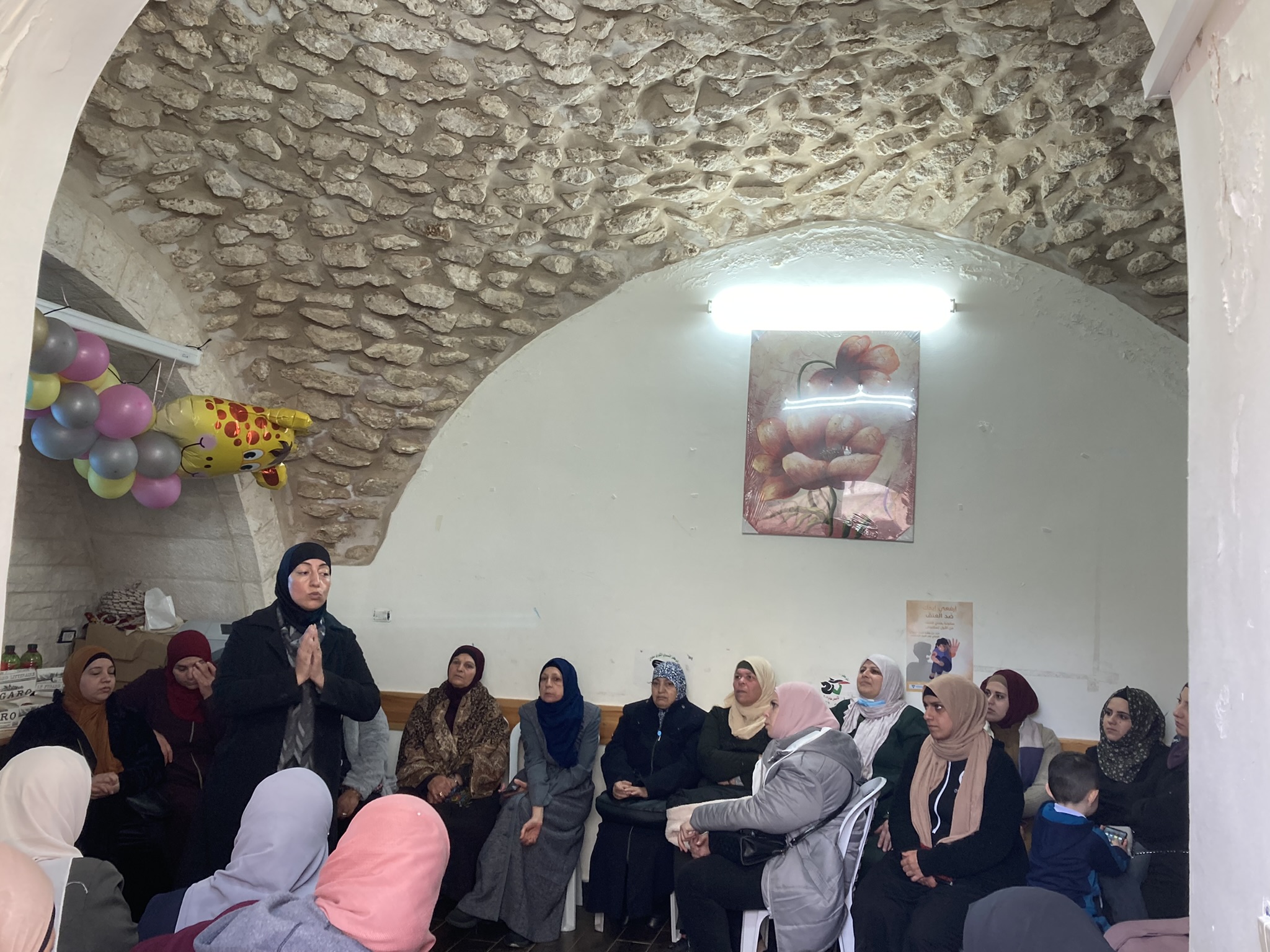
In an orientation session prior to starting job training Ms. Abeer Zayyad, director of AWC presenting a speech (East Jerusalem)
From the time this land was ruled by the British until the beginning of the Israeli occupation, women used to have power and rights in the community. This was because many men went to war or were in prison, leaving women with various responsibilities in the community and at home. However, after the Oslo Accords, most women’s centers were shut down, and women in many political parties were no longer able to hold higher positions. This can be clearly seen from the major Palestinian parties, Hamas and Fatah. There is not a single woman leader in Hamas. There is only one woman leader in the Fatah Party as well. Thirty percent of our community’s population is female. This means that at least half of the main positions should be held by women. However, the reality is completely different.
When men returned to their homes and communities after the war ended, they began to take away all the rights which were once granted to women. They used religion and tradition as excuses to take away women’s rights. It is very unfortunate that this situation has discouraged women’s participation in society throughout Palestine, and that men have come to dominate women.
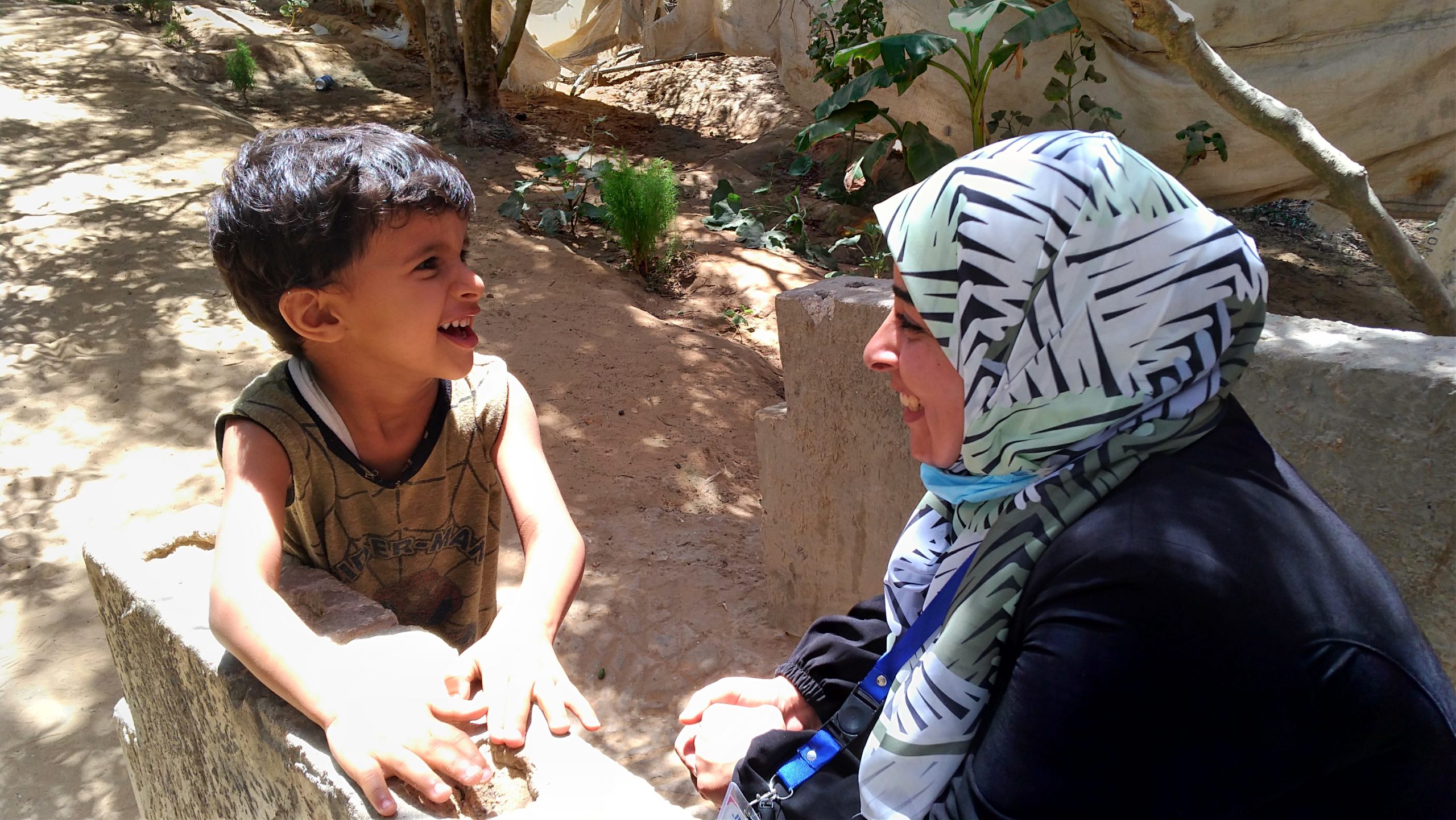
A woman volunteer who came to a nutrition seminar for children (Gaza)
During the first Intifada, women went wherever they wanted to go and threw stones at Israeli soldiers to join the action. At the time, no one thought it was wrong for women to act this way, to go out or express themselves. However, if women engage in such behavior now, they would be told that it is against the community’s way of thinking, that it is wrong, or that they should stay at home.
When I got married, I moved to the Al Thouri area, next to the Old Town of Jerusalem. It was a very conservative area where women found it difficult to live, and at that time there were no NGOs or civil society organizations to support women. I have four daughters, and I felt uncomfortable about having them growing up in such a conservative area. When I talked with friends who had the same aspirations and wanted to change this environment, we came up with the idea of establishing a women’s center here, and we decided to make a concrete move.
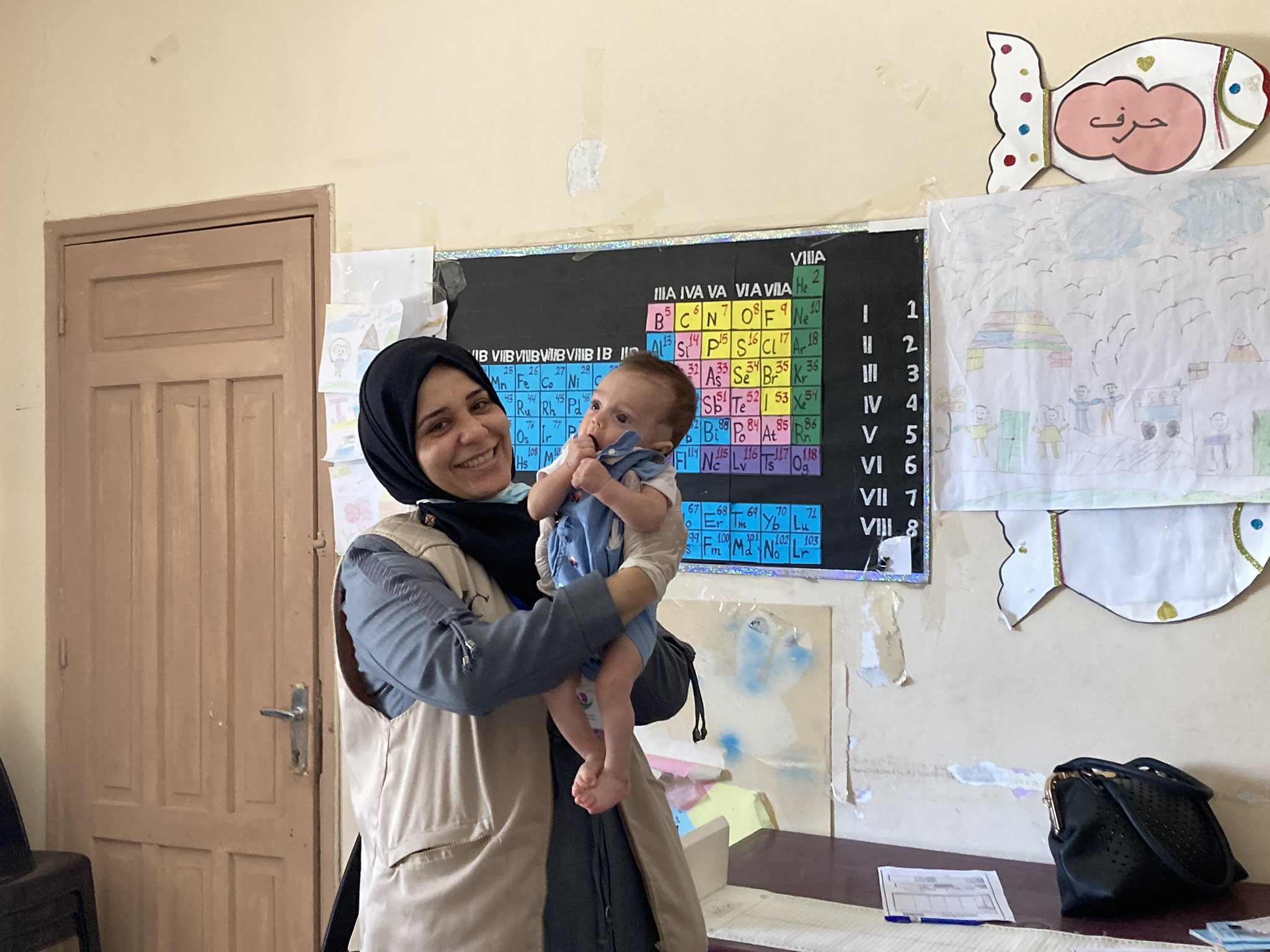
A woman volunteer who came to a nutrition seminar for children (Gaza)
When AWC was first established, the nearby residents (especially men) often made odd looks at the center, and there was a time when the center was closed due to the furious opposition by men in the community. Because of the conservative nature of the region and the impression that upholding rights and human rights would lead to the ‘imposition of Western ideas,’ we initially provided support of daily commodities to households in need of economic assistance.
As a result, AWC was able to create the impression that it is an organization that works for the community, and we were able to gradually increase women’s empowerment activities. Eventually, the men who saw our activities came to understand us and began to support us by doing heavy lifting activities and other work. Now, male residents are volunteering to help with the food distribution during Ramadan and at events.
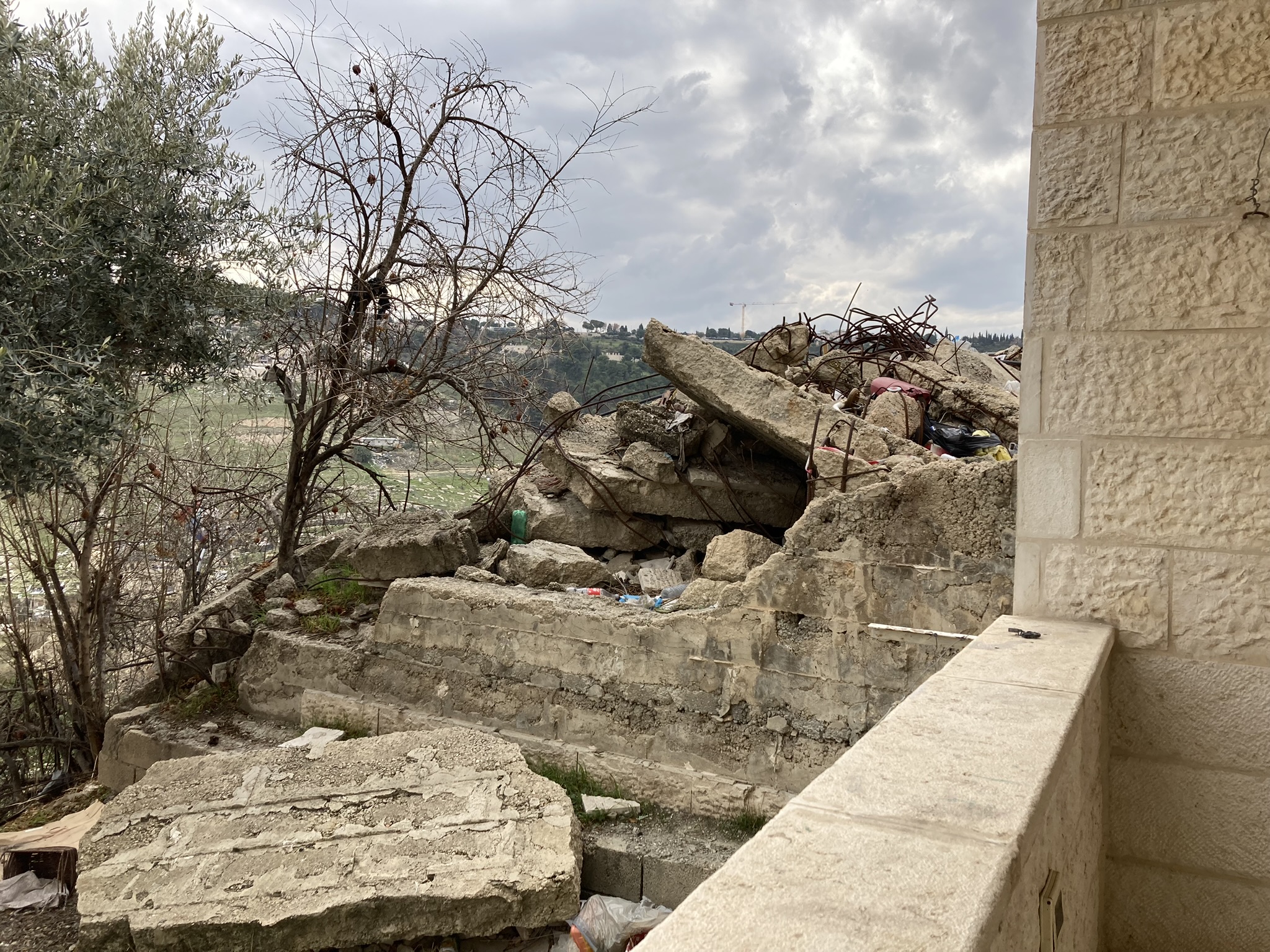
A house destroyed by Israel a few years ago, which was next to the office of our partner organization, AWC. (East Jerusalem)
AWC’s board of directors and staff are all women. That is why women in the community feel comfortable participating in our activities. Otherwise, if there is even one man on the board, there would be a fear that the entire AWC will be controlled by men, even if that person has a good understanding of women. Currently there are several organizations that support Palestinian women in Jerusalem, but they are mainly engaged in research, legal counseling, and protection of women’s rights, and only a few organizations like AWC provide direct support such as job training to women.
It has been 16 years since AWC was established, but there are still a small number of men who do not feel comfortable with our existence and activities. Here, ‘strong women’ are not desired at all. Because of this, there are still many challenges, and fundraising for activities is also still an issue.
Women have the ability to protect and support their families and make decisions for themselves. Women also have the right to learn and decide for themselves whom to marry. We want to change the way women’s rights are currently treated.
One of AWC’s goals is to ensure that women can gain their rights. To make this possible depends on the mindset within the community, not the situation they are in. We are fortunate to have staff who sympathize with AWC’s goals and beliefs, rather than their pay, and we hope to work as a team to improve the situation of women in this area.
Al Thouri Silwan Women’s Center (AWC)
It was established by Palestinian women in 2007 and has five staff members (including the director). The center focuses on women and children and works mainly in the Al Thouri and Silwan region of Jerusalem. They have set the following goals to realize a society in which there is no discrimination against women.
・Improve women’s rights and safety.
・Empower women’s decision making and leadership.
・Enhance women’s economic strength.
・Promote women’s participation in society.
As a good partner to support women’s activities
In Palestine, NGOs play a major role in helping women become independent and participate in society. NGOs offer a variety of training programs and services to help women gain new skills and knowledge. JVC is one of them and we work to empower women to take on leadership roles in their communities and take initiatives for social and economic change through activities, such as job training and maternal and child health services.
Currently JVC is running two projects. One is to support women’s social and economic independence through job training and leadership training in East Jerusalem. If a man cannot or will not work, the woman would be primarily responsible for supporting the family, which would place a heavy burden on her as a wife and mother. Therefore, as well as acquiring skills for gaining income, in order to become economically and socially independent, it is essential for women to have time to free themselves away from the pressures of daily life and the roles of wife and mother, have a safe place to gather, and have like-minded friends.
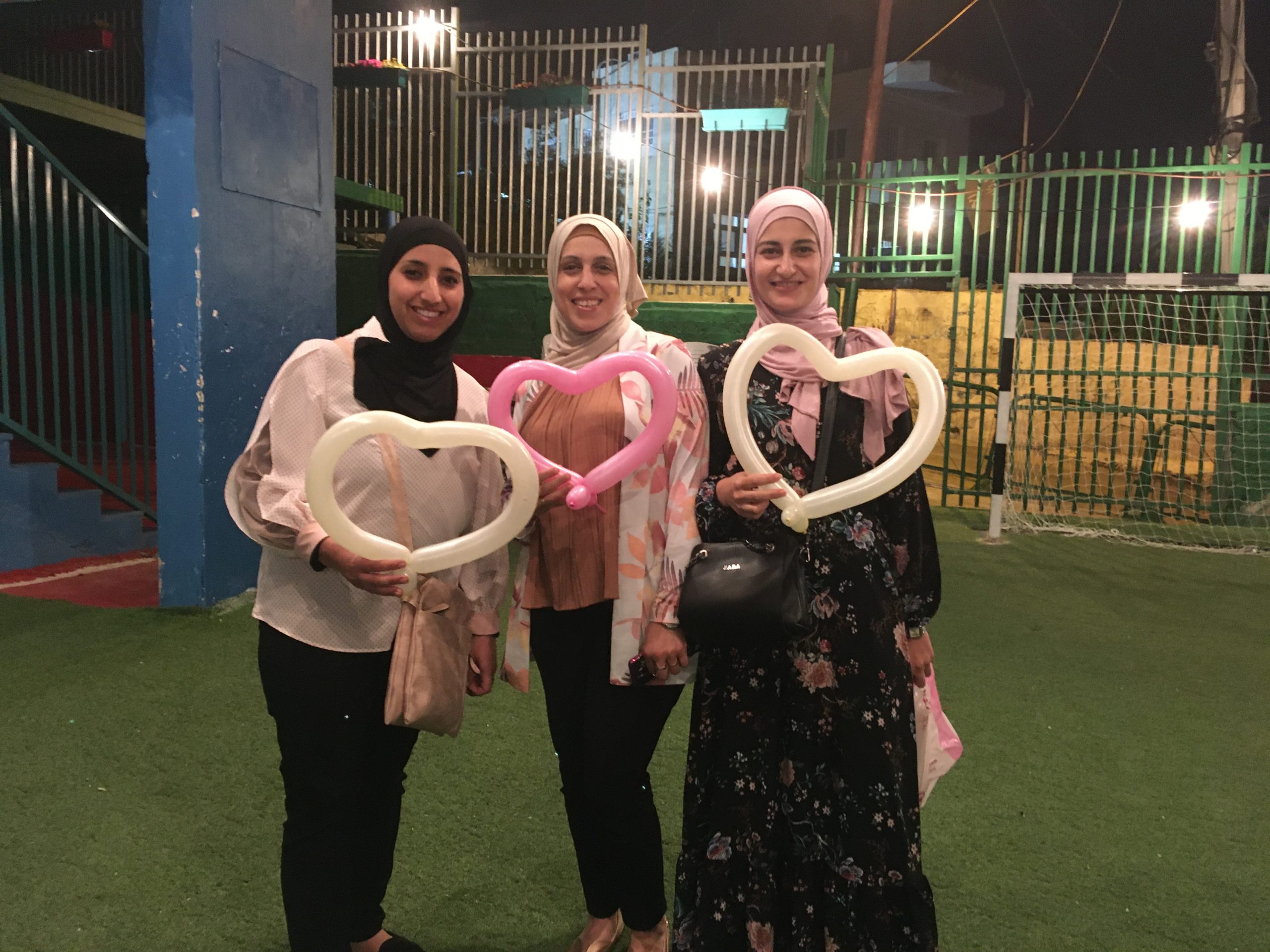
Staff of AWC celebrated Iftar (a meal after fasting) during the month of Ramadan. (East Jerusalem)
In the other project site, the Gaza Strip, we are working to improve nutrition for children under 5 years old. In this area, we train regional health volunteers who regularly check children’s development and provide parenting advice to mothers. The volunteers learn how to breastfeed, how to prepare nutritious and inexpensive baby food, and provide appropriate advice to mothers as senior child caregivers.
In Palestinian society, where women often live with their mothers-in-law or husband’s brothers, they often do not receive support from their mothers-in-law, sisters-in-law, or relatives, or may not receive correct knowledge and information about breastfeeding and baby food. To help those women, volunteers continue to pass on the correct knowledge they learned in the training and offer advice patiently. In regions where we have been active for many years, we are known as ‘doctoras (teachers)’ and are recognized as dependable and active.
In addition to Ms. Zayyad who we introduced previously, JVC has worked with many Palestinian women who are striving despite the difficult circumstances, and we have been touched by their strength and kindness. Although these women are involved in providing support, they are also put in difficult situations themselves and need assistance.
However, these women are not just waiting for help. No matter how difficult the situation, they are considerate of others and offer their help to those who need it. We would like to learn from them as we continue to work with them.
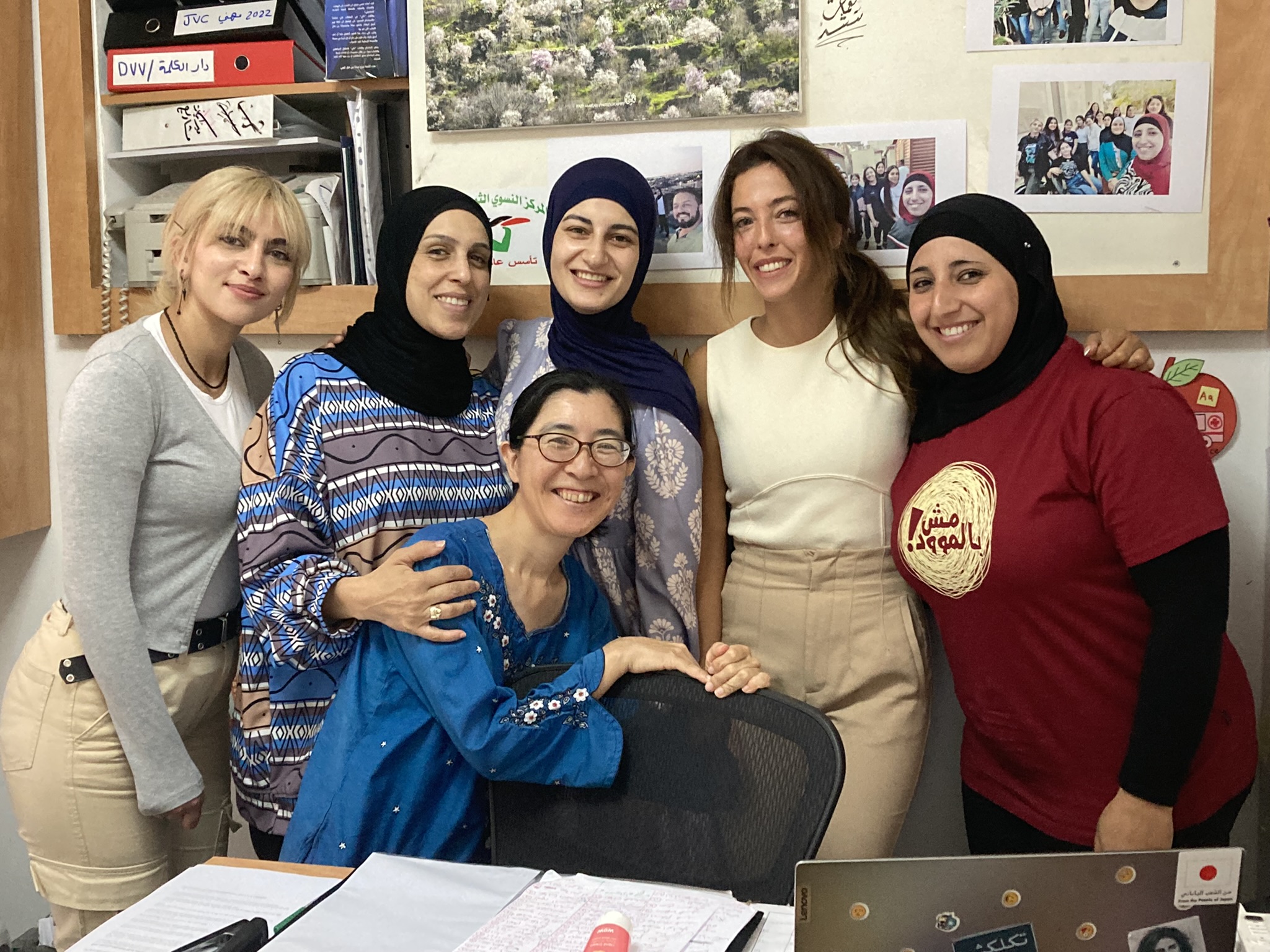
A commemorative photo with our partner organization AWC. Kimura (front) with JVC local staff Ayat (2nd from right).
Footnotes:
[1] The Crusaders. An expeditionary force sent by Western Catholic countries in the Middle Ages to reclaim the holy city of Jerusalem from Muslim countries. They headed for the land of Palestine in the 11th century, but there were no Muslims there at the time, so Jews became their target instead.
[2] Imperialism. A movement, ideology, or policy in which one nation or ethnic group attempts to create a powerful nation by invading, dominating, or oppressing other nations or ethnic groups. This is done politically, economically, or militarily in order to expand its own interests, territory, or power.
[3] Three-Tongue Diplomacy (British foreign policy on Palestine in the early 20th century). The foreign policy of Britain in the midst of World War I, when it made different agreements with the Arabs, the Russians and the French, and the Jews, respectively, regarding the land of Palestine.
[4] Honor Killing. The taking of a woman’s life (wife or daughter) by her husband or a male relative, such as a relative or sibling, who is alleged to have ‘committed an unchaste conduct that would bring dishonor to the family.’ Even if the woman is sexually violated by a man, only the woman become subject to punishment.
[5] Intifada. A general term for the Palestinian resistance movement against Israel that occurred between 1987 and 1993, the year of the Oslo Accords (a peace agreement between Palestine and Israel). The movement was also called ‘Stone Fighting,’ as Palestinians (including women and children) who did not have weapons resisted by throwing stones at Israeli soldiers.
Share This: